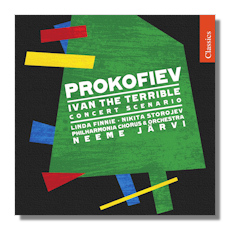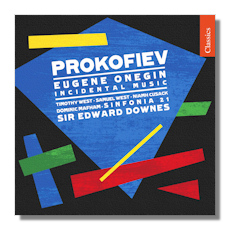
The Internet's Premier Classical Music Source
Related Links
- Prokofieff Reviews
- Latest Reviews
- More Reviews
-
By Composer
-
Collections
DVD & Blu-ray
Books
Concert Reviews
Articles/Interviews
Software
Audio
Search Amazon
Recommended Links
Site News
 CD Review
CD Review
Serge Prokofieff

Ivan the Terrible (Concert Scenario)
- Linda Finnie (contralto)
- Nikita Storojev (bass-baritone)
Philharmonia Orchestra & Chorus/Neeme Järvi
Chandos CHAN10536X


Eugene Onegin (Incidental Music), Op. 71
- Timothy West - Narrator
- Samuel West - Onegin
- Niamh Cusack - Tatyana
- Dominic Mafham - Lensky
- Helena McCarthy - Nurse, Larina, Anisia
- Terrance Hardiman - Zaretsky, Prince, Neighbor
- Katherine Fuge - Soprano
- Andrew Rutt - Bass
- Julian Walker - Bass
The New Company Chorus
Sinfonia 21/Edward Downes
Chandos CHAN10541(2)X 2CDs
These two Chandos recordings are reissues: Ivan was recorded in 1991 (Chandos CHAN8977) and Onegin in 1994 (Chandos CHAN9318/9). Both feature vivid sonics and fine performances. The Ivan the Terrible version here was fashioned by the late Christopher Plamer, who, more or less, took the better known Abram Stasevich oratorio based on Prokofiev's score, eliminated its narration and some of its music (like #2, March of the Young Ivan), reordered some numbers (Dance of the Oprichniki comes both before and after Feodor Basmanov's song here) and adds a number (At the Polish Court, which is track 12 here and which Leonard Slatkin first inserted on his Vox recording of Ivan after the Dance of the Oprichniki). At any rate, Palmer has done well by eliminating the totally superfluous narrator and by using most of Prokofiev's better music.
Järvi's reading is fairly lush, though the opening Overture is very briskly paced. No one else – including Stasevich, Muti, Slatkin, Rostropovich, and Polyansky and Fedoseyev in their recordings of the complete score – approach Järvi's tempo here. Still Järvi makes it work, and, more importantly, he delivers the rest of the score with utter commitment. This may be the best Ivan of them all. Try his utterly wanton, thoroughly grotesque opening to The Storming of Kazan, track 9 (#17 in the Stasevich), with its aggressive, growling tuba and proud, defiant brass. And the Dance of the Oprichniki, tracks 15 & 17 here, are deliciously uproarious. Linda Finnie and Nikita Storojev turn in fine work, as do the chorus and orchestra. The Philharmonia had recorded the work for Muti in 1978, with EMI (CDM769584-2), and I believe Järvi gets slightly more spirited playing from them. The sound reproduction is excellent and the notes informative. Highly recommended!
Now we come to a reissue that coincides with a tragedy, of sorts. Sir Edward Downes and his wife Joan, a former ballerina, ended their lives at an assisted suicide clinic in Switzerland on July 10, 2009, four days before the American release date of this recording. She was terminal; he was not, though his eyesight was failing and at 85 apparently had little desire to continue living without his wife. Downes was associated with the works of Verdi, Wagner, and of Prokofiev. Prokofiev left his first opera, Maddalena, with only one of its four scenes orchestrated. Downes orchestrated the remainder of the work from the piano score left by Prokofiev and the opera was premièred in 1979. Downes also conducted many other works by Prokofiev, including the opera War and Peace.
Here Downes turns in a fine reading of this melody-rich Prokofiev score. I say "melody-rich" because Onegin contains many famous Prokofiev themes, including several that would appear in War and Peace, the Seventh Symphony (third movement), Cinderella (the famous love theme, marked Amoroso, and other numbers), Piano Sonata #8 (second movement theme) and much else.
Downes takes judicious tempos for the most part and deftly points up all the drama in the score. The playing of Sinfonia 21 is fully committed. On the musical end of things then, this CD is a winner. But there is another side to it: Chandos has given us a play about Evgeny Onegin, with narrator and actors. These added performers offer much narration and dramatic verbiage, often with someone speaking over the music. The style of acting necessitated by this kind of drama requires an operatic kind of overacting. The players are good though, even if their diction isn't always clear. The narrator, Timothy West, is excellent. This performance times out to about two hours and five minutes, whereas the complete score, minus text, is a bit more than half that, as is evidenced by Michail Jurowski in his 2003 recording on Capriccio 67149/50, which has a timing of 76:16. Vladimir Ponkin, in his 1991 recording on Le Chant du Monde 788027, took a little over an hour, but I believe his version isn't complete.
In the end, potential buyers will have to weigh the options: this Chandos set is available on two CDs with no filler, while the Capriccio set, also comprised of two CDs, is coupled with the score from Prokofiev's The Queen of Spades. The Chandos CD features excellent sound and fine notes. Both conductors are alert to Prokofiev's drama, but I must say that Downes has the clear edge overall.
Copyright © 2009, Robert Cummings




















